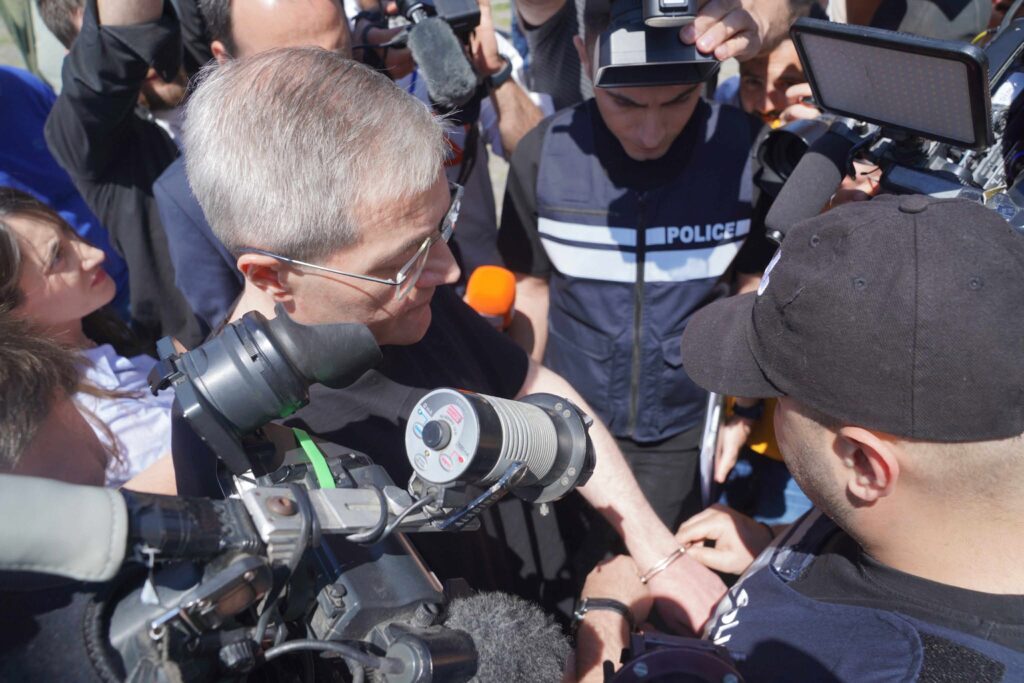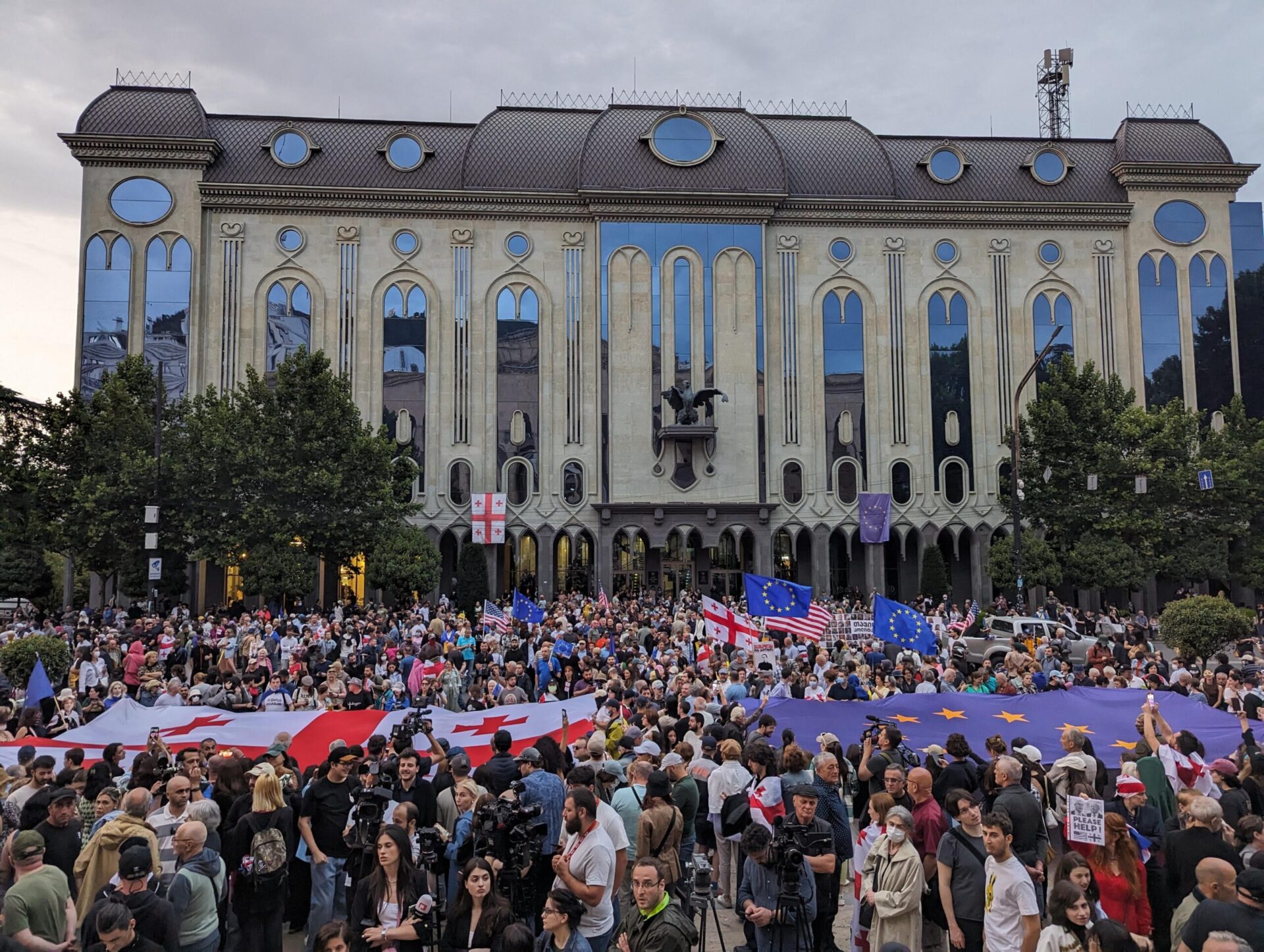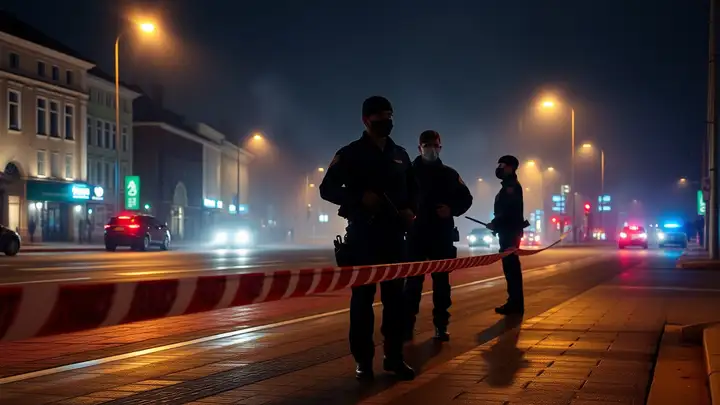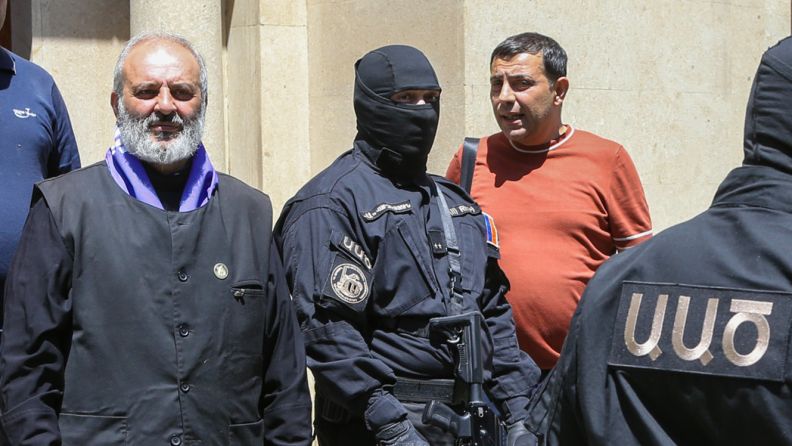
Georgian Dream Detains Eight Opposition Figures
Georgian Dream Detains Eight Opposition Figures
Executive Summary:
- Georgian Dream has detained eight prominent opposition figures ahead of the upcoming local elections, fulfilling a pre-election pledge by the honorary chairman of the ruling party, Bidzina Ivanishvili.
- The detentions stem from a refusal to appear before a parliamentary commission that many view as illegitimate and politically motivated.
- Experts, international organizations, and foreign partners warn that this is an authoritarian tactic, entirely at odds with the democratic standards expected of an EU candidate country.
On June 27, Givi Targamadze, a prominent opposition figure and former chair of Georgia’s Parliamentary Committee on Defense and Security, was sentenced to seven months in prison after refusing to appear before a controversial investigative commission (Publika, June 27). Just days earlier, fellow opposition leader Giorgi Vashadze received a similar sentence, joining a growing list of political figures jailed under the Georgian Dream government’s post-election crackdown (Formulanews, June 24). These developments come just months before Georgia’s local elections and follow a public promise made by Georgian Dream’s founder and honorary chairman, Bidzina Ivanishvili, to imprison opposition leaders for what he labeled “treasonous actions.”
On August 31, 2024, during a pre-election campaign event in Western Georgia, Ivanishvili publicly vowed that, following an electoral victory, the government would bring the collective United National Movement (UNM) to justice. Referring broadly to the opposition as a whole, Ivanishvili accused them of what he described as “treasonous actions.” He stated, “Following the convincing victory of Georgian Dream in the parliamentary elections of October 26, 2024, the participation of radicals in Georgian politics must end once and for all” (1tv.ge, August 31, 2024).
Approximately six months after the elections, Georgian Dream began implementing Ivanishvili’s central campaign promise. Over the past several weeks, eight prominent opposition figures have been detained for refusing to appear before a highly controversial parliamentary investigative commission. The commission was established to investigate the actions of the government of former President Mikheil Saakashvili between 2003 and 2012 (Netgazeti, June 28). The Prosecutor’s Office has charged opposition figures under Article 349 of the Criminal Code, which pertains to the failure to comply with a request from a temporary parliamentary investigative commission (Civil Georgia, May 22). Opposition parties view both the commission and the current parliament, however, as illegitimate and have refused to take part in what they consider an unlawful process.
The latest opposition figure to be detained is Givi Targamadze, a prominent politician who chaired the Parliamentary Committee on Defense and Security from 2008 to 2012. He had been assigned bail for 10,000 GEL ($3,690) as a preventive measure, but refused to pay. On June 27, he was sentenced to seven months in prison for failing to comply with the bail conditions after refusing to appear before the parliamentary commission. Targamadze awaited the verdict at home and later voluntarily turned himself in at the Vake-Saburtalo police station. Before entering the station, he made a statement to journalists, asserting that he had the right to believe the verdict was “ordered by Russia.” Givi Targamadze claimed that his arrest was orchestrated by Russia, where he has already been sentenced in absentia and remains on a wanted list. He also alleged that Russian authorities previously attempted to assassinate him—an attempt he survived, adding that he “will survive again.” (Publika, June 27).
Just days earlier, on June 24, Tbilisi City Court sentenced Giorgi Vashadze, leader of the opposition political party Strategy Aghmashenebeli, to seven months in prison for failing to appear before the investigative commission. Judge Nino Galustashvili delivered the decision. Vashadze did not attend the court hearing and instead awaited the verdict at his party’s headquarters (Radio Tavisupleba, June 24). In a show of solidarity with Vashadze, his party colleagues gathered at the party’s headquarters, joined by Georgia’s fifth president, Salome Zourabichvili, as well as representatives from the UNM, Lelo, and Coalition for Change parties. Speaking at the gathering, Zourabichvili condemned the developments, stating,
Such things are unimaginable in a country that belongs to Europe, is moving toward Europe, and will undoubtedly join Europe. In this space, violations of human rights and multiple articles of the Constitution, such as these, should not occur. I think Strasbourg will soon no longer accept the appeals being sent from here. I never imagined this would happen when I came to this country (Radio Tavisupleba, June 24).
Zourabishvili also attended the arrest of two other opposition leaders the day before, on June 23. Following a decision by Tbilisi City Court Judge Zviad Sharadze, politicians Mamuka Khazaradze and Badri Japaridze were detained at the Lelo party’s office for refusing to appear before the investigative commission. They were sentenced to eight months in prison and banned from holding public office for two years (Radio Tavisupleba, June 23).
The wave of detentions has also affected other prominent opposition figures. Among those currently behind bars are Nika Melia and Nika Gvaramia, leaders of the Akhali Party (Civil Georgia, May 29; Radio Tavisupleba, June 13). Additionally, Zurab Girchi Japaridze, a leader of the party “Girchi – More Freedom,” was arrested in the courtroom itself (Radio Tavisupleba, May 22). Former Defense Minister Irakli Okruashvili has also been taken into custody (Radio Tavisupleba, May 14).
The only opposition leader who chose to appear before the investigative commission was Giorgi Gakharia, the former prime minister and leader of the “For Georgia” political party. On April 14, he answered the commission’s questions; however, this did not prove sufficient (Radio Tavisupleba, April 14). He was summoned again and participated remotely on July 4. The investigation concerns his alleged role in ordering the construction of a checkpoint near the Tskhinvali occupation line in 2019, during his tenure as Minister of the Interior, without coordinating with other relevant agencies. According to the prosecution, this decision “almost triggered an armed confrontation” with Russian forces stationed in the area. Gakharia’s party has dismissed the case as politically motivated and aimed at weakening him as an opposition leader (Civil Georgia, July 4).
With just months to go before Georgia’s local elections, opposition parties are already drawing clear lines around their plans. Giorgi Gakharia’s party, “For Georgia,” and the coalition “Lelo – Strong Georgia” have announced they will run with joint, agreed-upon candidates. On July 14, the two political forces signed a memorandum of cooperation to formalize their alliance (Netgazeti, July 14; see EDM, July 15). In contrast, other opposition parties involved in the pro-European protest movement have ruled out participating in the elections and say they do not intend to collaborate with the memorandum’s signatories (Radio Tavisupleba, July 14). For much of the opposition, even discussing elections feels misplaced amid the country’s deepening political crisis, particularly with the mass arrests of opposition leaders. Many of them are expected to remain behind bars when voters head to the polls, raising serious concerns about the fairness and legitimacy of the upcoming vote.
The recent wave of detentions has sparked growing concern among politicians, experts, and human rights lawyers both within Georgia and internationally. Foreign partners and international organizations have repeatedly called on the Georgian Dream party to abandon its current approach. “The authorities must end practices that violate Georgia’s international human rights obligations. The government must protect and ensure the human rights of everyone in the country,” Amnesty International stated (Radio Tavisupleba, June 28). Anita Hipper, spokesperson for the European Commission on foreign affairs and security policy, responded to the arrest of opposition political leaders, stating, “These are authoritarian tactics, the opposite of what is expected from an EU candidate country. Georgian Dream must stop weaponising the justice system” (Radio Tavisupleba, June 24; X/@ExtSpoxEU, June 24).
In Georgia, many strongly believe that the establishment of the parliamentary commission was merely a pretext to fulfill Ivanishvili’s promise to imprison opposition leaders. This belief was further reinforced on June 23, when Prime Minister Irakli Kobakhidze stated in an interview with journalists that anyone who does not recognize the current parliament “will be sent to jail” (Publika, June 23).
If the current trajectory continues, Georgia risks deeper democratic backsliding and growing isolation from its Western partners. Many fear that these developments could ultimately derail the country’s long-standing aspiration for EU membership—a goal that remains widely supported by the Georgian public.


